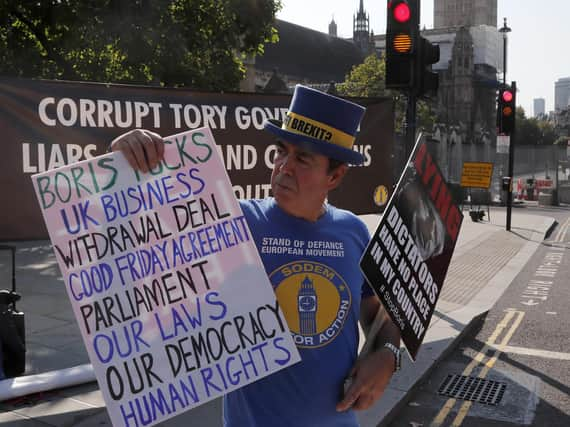Holyrood urged to refuse Brexit Bill consent in 'defining moment for union'


Mike Russell, the Scottish Government's constitutional relations secretary, said he would ask MSPs to back his decision not to grant consent to the Bill, in the hope it will "kill it stone dead”.
The Scottish Parliament has to agree a Legislative Consent Memorandum (LCM) when UK legislation impacts on devolved matters.
Advertisement
Hide AdAdvertisement
Hide AdHowever, Mr Russell said the Bill “undermines devolution and breaches international law" and recommending consent would “be incompatible with Scottish ministers’ responsibilities under the Ministerial Code.”


The Bill has been heavily criticised by all devolved administrations, as well as opposition MPs and MSPs, for overriding the devolution settlements.
The UK Government has said it was required to ensure a level playing field for trade across the UK after Brexit.
It aims to enshrine “mutual recognition and non-discrimination” in trading between the four nations of the UK, making sure any goods and services which can be sold in one part of the UK can be sold in any other, and that no nation’s government can introduce regulations which would favour goods or services in one part of the UK over another.
However, the Bill amends the EU Withdrawal Agreement and the UK Government has accepted in doing so it breaches international law in a “limited way”. Boris Johnson’s Government has argued this is necessary to protect Northern Ireland and the rest of the UK if trade negotiations with Europe break down.
The Scottish Government’s Ministerial Code states the “overarching duty on Ministers to comply with the law, including international law”.
Despite concerns in Westminster about the legislation, MPs voted on 14 September to back the Bill by 340 votes to 263.
Today Mr Russell said his recommendation for Holyrood not give consent was a “defining moment that will determine both the future of the Scottish Parliament and whether or not the UK can be described as a partnership of equal nations”.
Advertisement
Hide AdAdvertisement
Hide AdHe said: “UK Government ministers have accepted the Bill will break international law. It would be equally outrageous if they decided also to break the constitutional convention that the Westminster Parliament does not legislate in devolved areas without the consent of the Scottish Parliament.
“The UK’s established constitutional rules mean that the consent of the Scottish Parliament is required for the UK Government’s Internal Market Bill to proceed. If the Parliament refuses to grant consent then that should kill the Bill stone dead. It will demonstrate beyond all doubt that the UK Government does not believe the UK to be a partnership of equals.
“This Bill opens the door to a post-Brexit race to the bottom and will mean democratic decisions of the Scottish Parliament on public health, environmental standards, food standards and a range of other key areas can be over-ridden.
“The Scottish Government will ask the Parliament to make a decision on whether to grant consent next month and the memorandum we have published today sets out in detail why we could never recommend the Parliament agrees that its powers should be eroded so fundamentally.”
Scottish Secretary Alister Jack has already said the UK Government plans to press ahead with the legislation - without the backing of the Scottish Parliament if necessary.
Scottish Conservative constitution spokesman Dean Lockhart said: “The UK internal market bill protects 545,000 jobs across Scotland and is essential for our businesses who trade with the rest of the UK.
“The SNP have yet to explain why they would recommend putting over half a million jobs and livelihoods in Scotland at risk with their opposition to this bill.
“This legislation is vital in order to ensure that Scotland’s links with its most important market are not only maintained but can be built upon going forward.”
Advertisement
Hide AdAdvertisement
Hide AdBut Scottish Labour’s spokesperson on Brexit and the constitution, Alex Rowley, said: “The internal market bill is riddled with flaws that would de-stabilise devolution across the UK and undermine the union.
"This approach will be resisted across the devolved administrations and Boris Johnson needs to listen.”
A message from the Editor:Thank you for reading this story on our website. While I have your attention, I also have an important request to make of you.With the coronavirus lockdown having a major impact on many of our advertisers - and consequently the revenue we receive - we are more reliant than ever on you taking out a digital subscription.Subscribe to scotsman.com and enjoy unlimited access to Scottish news and information online and on our app. With a digital subscription, you can read more than 5 articles, see fewer ads, enjoy faster load times, and get access to exclusive newsletters and content. Visit https://www.scotsman.com/subscriptions now to sign up.
Our journalism costs money and we rely on advertising, print and digital revenues to help to support them. By supporting us, we are able to support you in providing trusted, fact-checked content for this website.
Joy Yates
Editorial Director
Comments
Want to join the conversation? Please or to comment on this article.